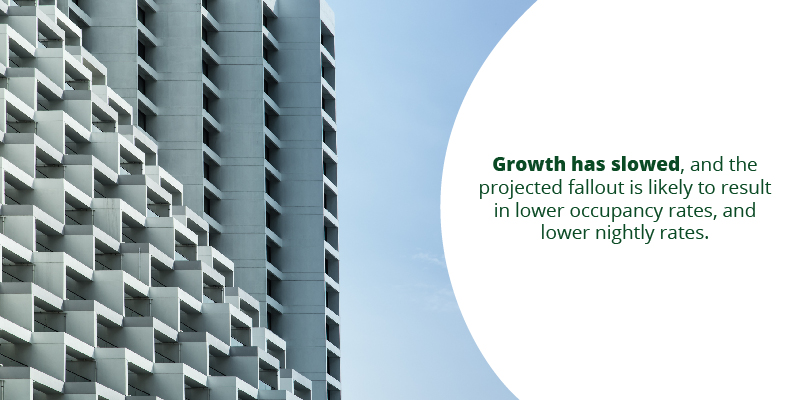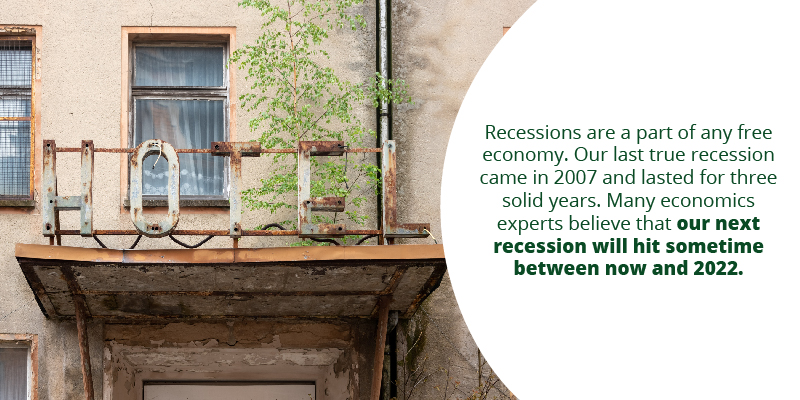
Like many industries, the hospitality business has been steadily regaining its footing since the end of the Great Recession around 2009. Many recent estimates project a flattening or even reverting trend of hospitality growth in the US. There are also industry disruptors to contend with including Airbnb and other home sharing services. At the end of the day, the hospitality industry has endured — but investing in hotels has always been a risky bet. Today, we will review some of the biggest reasons why investing in commercial real estate within the hospitality market remains a high risk endeavour.
The Problems with Hotels as Investment Properties
1. Hotel/hospitality industry growth is expected to slow

As mentioned in the introduction, the hotel business has had a very solid decade. All major metrics have risen steadily thanks to a resurging economy and an industry that learned many lessons after the Great Recession. The past few years have painted a slightly different picture. Growth has slowed, and the projected fallout is likely to result in lower occupancy rates, and lower nightly rates.
CBRE points to “growth in local market supply, low inflation, competition from the sharing economy and the expansion of intermediaries in the sales process” as major reasons for this decline. It should also be noted that the stalling within the hospitality industry may be a sign of a looming recession (more on this below).
2. Hotel investment can be prohibitively expensive
While the majority of commercial real estate construction projects tend to come with high price tags, hotel construction costs should not be overlooked. Hotel construction costs can vary dramatically from a few million to hundreds of millions of dollars. Fixr.com puts the median hotel construction bill at approximately $22.2 million not including land acquisition or demolition costs. For CRE veterans, that number may not ruffle many feathers. Yet in conjunction with some of the other risk factors we are discussing today, an investment of that size can be a tough sell to investors.
3. The hospitality business is seasonal and volatile

A well known risk of the hospitality business is the seasonal, volatile nature of occupancy and room rates. This is particularly true for “tourist” hotels in areas near ski resorts or beaches. For investors, the word “volatility” does not often inspire great faith. For an even more extreme example, consider a traditional hotel powerhouse: New York City. In the wake of the 9/11 tragedy, the usually rock solid hotel business in NYC plummeted. Vacancy rates were high and nightly rates were low. Experienced, well-equipped investors stayed pat and waited for the regional economy to bounce back. Yet this is a cautionary tale that investors should be prepared to take losses on the path towards a return on their investment.
As a brief counterpoint, investing in hotel REITs is an appealing alternative for investors who believe in the profitability of the hospitality industry without risking large dollar amounts on single hotels. REITs work in a similar fashion to mutual funds or ETFs, where investors can buy shares in commercial real estate collectives.
4. Estimating ROI for hotels is more difficult than many other commercial real estate properties
Estimating returns on investment is not an exact science. Yet some investments are easier to project than others. For example, if a young couple buys a starter home for $100k in a neighborhood where most houses are selling for $200k, they can feel relatively confident that some renovations will net them a solid return when they sell. When it comes to investing $20 million for a hotel, that calculation is significantly more intricate. Factors which remain fluid include: occupancy rates, taxes, room rates, inflation, other hotels opening or closing in the area, staff turnover, overhead costs, and much more.
5. Hotels are notoriously susceptible to recessions

Recessions are a part of any free economy. Our last true recession began in late 2007 and the effects lasted for three solid years. Many economics experts believe that our next recession will hit sometime between now and 2022. That being said, no matter when the next recession comes, it will almost certainly hit the hospitality industry hard. Travel is amongst the first “luxury” expenses that individuals and businesses cut when the economy slows. Much like seasonality and day-to-day volatility, hotel investors should plan to absorb recession hits with some regularity.
Going Forward
Hotels can be profitable real estate investments when handled properly. There will always be a demand for lodging from economy motels to luxury suites. The hotel business has been growing at a steady pace since the economic crisis in the late 2000’s. Yet many commercial real estate investors believe that the risks outweigh the potential benefits due to slowing hospitality industry metrics, industry volatility, high upfront costs, difficult to calculate ROI, and going into a business that is susceptible to recessions.
Going forward, it is likely that the hotel business will stall or even backtrack for a short period of time. Political and economic uncertainty may have a heavy influence on this volatile market. The key to investing in hotels is understanding the risks involved and planning accordingly. As with all commercial real estate ventures, there is certainly money to be made in hotels.
